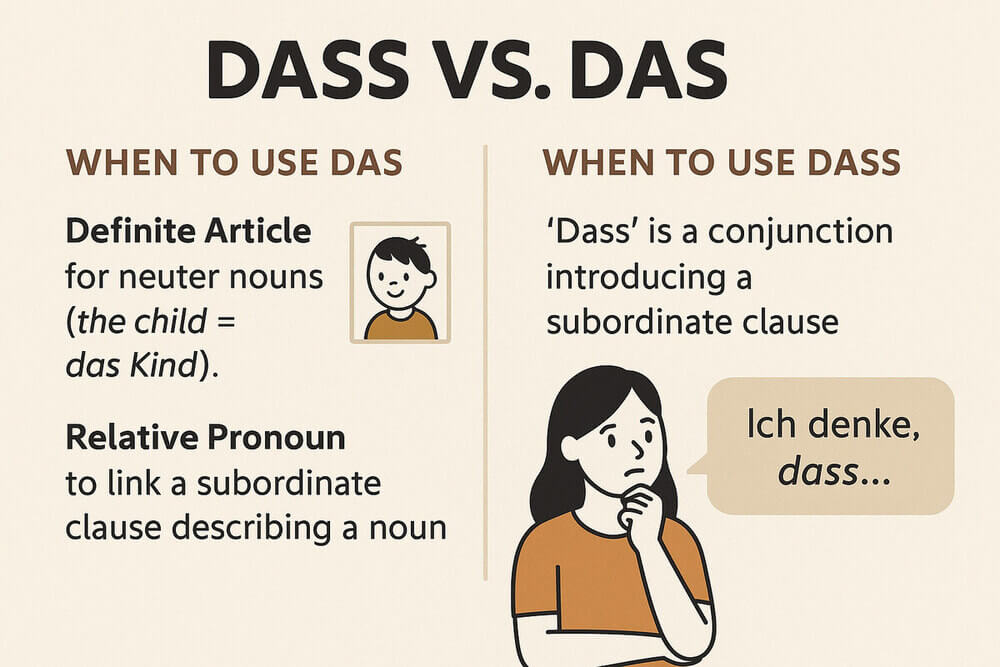Table of Contents
Introduction
German learners often wonder whether to use “das” or “dass.” The two words look alike, yet their functions differ. Using them correctly makes your writing and speaking more precise. In this guide, you’ll learn how to tell them apart and how they affect sentence structure. For more insights on German word order, see our article on
word order.
Difference Between Dass and Das

The word “das” can serve as a definite article (like the) or a relative pronoun (similar to that/which) in subordinate clauses. Meanwhile, “dass” is strictly a conjunction, used to introduce a subordinate clause expressing a statement or an idea.
If you can replace das with dieses, jenes or welches, you likely need “das.” If you’re forming a clause meaning “that…” to express a thought, feeling, or statement, you need “dass.”
When to Use Das
You’ll see das in two primary roles:
- Definite Article: for neuter nouns (the child = das Kind). Learn more about German articles at our
German articles overview. - Relative Pronoun: to link a subordinate clause describing a noun. For more on relative clauses, read our post on
relative clauses.
Example Sentences with “Das”
| German | English Translation |
|---|---|
| Das Haus ist sehr groß. | The house is very big. (Definite article) |
| Ich mag das Buch, das du empfohlen hast. | I like the book that you recommended. (Relative pronoun) |
| Das Essen schmeckt lecker. | The food tastes delicious. (Definite article) |
| Kennst du das Lied, das im Radio läuft? | Do you know the song that is playing on the radio? (Relative pronoun) |
When to Use Dass
“Dass” is a conjunction that introduces a subordinate clause, usually expressing statements, assumptions, or emotions.
Example Sentences with “Dass”
| German | English Translation |
|---|---|
| Ich hoffe, dass du morgen kommst. | I hope that you come tomorrow. |
| Wir wissen, dass er aus Berlin ist. | We know that he is from Berlin. |
| Es ist schade, dass das Wetter schlecht ist. | It’s a pity that the weather is bad. |
| Sie hofft, dass alles gut geht. | She hopes that everything goes well. |
Sentence Structure: Das vs. Dass
In German, a das clause can appear as a main clause (when acting as an article) or as a subordinate clause (when acting as a relative pronoun). A dass clause is always subordinate. For more details on how verbs and elements move in German sentences, see our
German word order article.
Das as a Definite Article (Main Clause): “Das Auto fährt schnell.”
Das as a Relative Pronoun (Subordinate Clause): “Ich mag das Auto, das du gekauft hast.”
Dass as a Conjunction (Subordinate Clause): “Ich denke, dass das Auto sehr schnell ist.”
Tips and Tricks to Identify “Dass”
- Check for Conjunction Meaning: If you need “that” to introduce a statement or an idea, dass is correct.
- Try Substituting “This/These”: If you can replace it with dieses, jenes or welches and it still makes sense, use das.
- Look for Two Clauses: “Ich weiß, dass…” or “Sie sagt, dass…” indicates dass starts a subordinate clause.
Dass or Das Quiz
Practice what you have learned with our free dass vs. das quiz.
Conclusion
Knowing when to use das (article or relative pronoun) versus dass (conjunction) is important to clarity in German. If you can replace the word with dieses, jenes or welches, it’s “das.” If you need a conjunction that connects a statement (like “I know that…”), choose “dass.” Over time, these distinctions become second nature.
Keep Learning German – Helpful Resources
FAQ
Can I always swap “das” and “dass”?
No. “Das” might be an article or relative pronoun, whereas “dass” is always a conjunction.
Can “das” appear in subordinate clauses?
Yes. As a relative pronoun, “das” introduces subordinate clauses. For more on relative pronouns, check our post on
relative clauses.
Which usage is more common in everyday speech?
Both forms appear regularly. “Das” as an article is extremely frequent, and “dass” often appears in reported speech or statements.
Where can I learn more German grammar?
See our page on grammar articles overview or practice with grammar quizzes.
